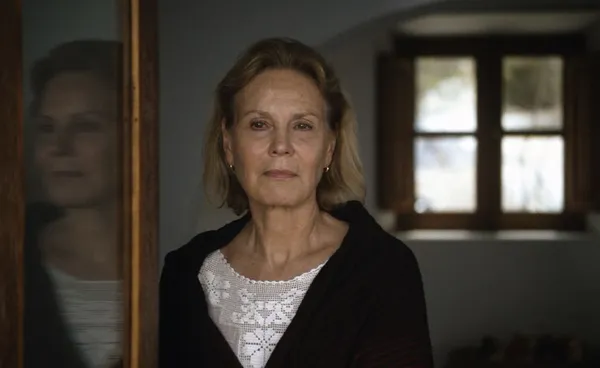 |
| Marthe Keller stars in Barbet Schroeder's Amnesia |
Barbet Schroeder's Amnesia, starring Marthe Keller and Max Riemelt with Bruno Ganz, Corinna Kirchhoff, Fermí Reixach, Marie Leuenberger, and Joel Basman is a supremely personal chamber piece by the filmmaker who brought us Hollywood films such as Reversal Of Fortune (which won Jeremy Irons an Oscar), Barfly (Faye Dunaway, Mickey Rourke) or Single White Female (Bridget Fonda, Jennifer Jason Leigh), who worked with Jacques Rivette and Jean-Luc Godard and directed an episode of Mad Men.
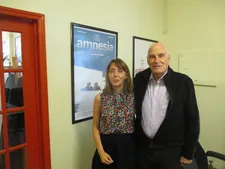 |
| Barbet Schroeder with Anne-Katrin Titze on Nelly Quettier: "She's a great editor." Photo: Steven Beeman |
In New York before the opening, Barbet spoke with me about his editing on a "huge white wall" with Nelly Quettier (Terror's Advocate, Claire Denis' Beau Travail, Ursula Meier's Home, Leos Carax's Holy Motors), a Nanni Moretti-like Mia Madre idea, Walter Benjamin and Raoul Hausmann, the mood of Georgia O'Keeffe's house, his grandfather, famous psychiatrist and art historian Hans Prinzhorn, the fascinating water system of Ibiza architecture, nostalgia, and his impressive cast.
Inspired by Schroeder's mother, now a centenarian, and other real occurrences, Amnesia confronts family lore, the nature of storytelling, guilt, unexpected love and how to deal or not deal with being German, generation after generation.
"How could I ever speak that Nazi language again" says Martha (Marthe Keller), who lives in a simple white cube house on the island of Ibiza, overlooking land and sea. "Germany moved on" says Jo (Max Riemelt), a disc jockey from Berlin who recently had arrived into the house up the hill from hers. The two of them form an unusual bond, that subverts their difference in age and background.
Bruno Ganz as Jo's grandfather and Corinna Kirchhoff as Jo's mother join the unlikely platonic couple for a paella dinner that shatters long-held beliefs and makes all four of them retrace some steps. Set mainly in 1990, after the fall of the Berlin Wall, encased by a frame narrative ten years later, Schroeder in this film juxtaposes the timeless beauty of the island of Ibiza with history's long shadows.
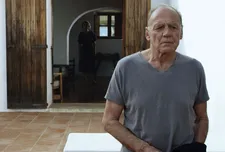 |
| Jo's grandfather Bruno (Bruno Ganz): "He is something from another story." |
Anne-Katrin Titze: Your editor, Nelly Quettier, was also the editor for Holy Motors.
Barbet Schroeder: Yes, and for Claire Denis.
AKT: Beau Travail.
BS: She's a great editor. I just did another movie [Le vénérable W.] that we also edited in the same place, in the house [on Ibiza]. And she also did the documentary before that, Terror's Advocate.
AKT: "It feels good to sell your soul to the devil" is one of the sentences when the other characters [in Amnesia] find out that Martha [Marthe Keller] speaks German.
BS: No, it was after that, "invite her to a good restaurant." That's the phrase. The other is a phrase I kept but that I never really truly liked. I chose the other phrase that it would be good to invite her to a good restaurant.
AKT: The sentences follow each other, though, don't they?
BS: Right. It was very close to that in the scene. That is a turning point, where suddenly the boy realised that she actually speaks German and actually can understand what he is saying with his friend. And that she never wanted to acknowledge it. He feels it's like a betrayal.
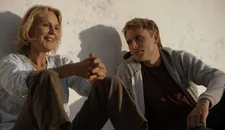 |
| Martha (Marthe Keller) with Jo (Max Riemelt): "It cannot go on forever, that's the idea." |
The idea of not speaking German is so strong in her [Schroeder's mother, who inspired Martha - they blend during our conversation] that she never spoke German to me. I don't speak my mother's language, my mother's tongue. This is quite the extreme. So I was careful not to be afraid of attacking her in the movie, which was extremely bold of me.
There are moments in the movie where you feel that maybe she is not completely right. The idea behind her decision is completely right but maybe to push it to that extreme can be argued. No one knows in the end when you make a decision like that - never to speak German - where it can lead you.
AKT: And your mother actually kept to it?
BS: Yes, she kept to it. And then one day, I was going to visit her - she was living exactly like the character [Martha] with a vegetable garden, fishing the fish that she ate - and I came one day and asked her "What happens when you don't fish?" She said, "oh, I eat a potato." She was living a really philosophical life, very very minimal.
She was a loving example for the young people who were friends of this guy [Jo in the film, played by Max Riemelt]. I arrived and there was this guy and his friends who were coming to visit and they adored her. And she told me she was in love. And of course, I understood that it was a platonic love. But at the same time, they were dying to see each other whenever they had an appointment.
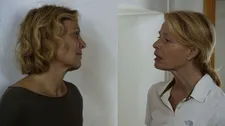 |
| Martha being confronted by Jo's mother Elfriede (Corinna Kirchhoff) |
AKT: And the grandfather, played by Bruno Ganz in your film, does he also exist? Or is he an invention of yours?
BS: He is something from another story. I didn't want to just do a movie about my mother. No, that was not interesting, but to compose a story…
AKT: Nanni Moretti already did that…
BS: Yes! Hah. But to compose a story with all these elements of reality and to do some kind of a collage. Every element is real.
AKT: It's interesting how the different types of amnesia work like a puzzle, how the stories are so fractured and fragmented. Martha's story about the bus exchange of children in Switzerland, arranged by Himmler has so much at the edges that we don't get to know about. Similarly, the story Bruno talks about - it is falling apart in our hands. I felt that was important in your film - that the stories are brittle and blurry.
BS: Absolutely, absolutely, that was the scary thing, that you never know. And the wonderful line of Max - I call him Max because of the actor - this wonderful line he says: "How can I be sure there's nothing else in this story?" So we always are unsecured how far it goes in one direction or the other.
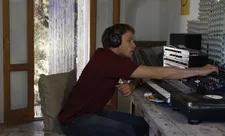 |
| Jo (Max Riemelt) mixing his music |
AKT: He becomes a child again when he says his favorite bedtime story changed - which was the legend that his grandfather was one of the good guys. There is another line in Amnesia, "It's not over, it can never be over." Is your film in some respect about how to deal with being German?
BS: Exactly. Absolutely and through different generations. Every generation has another problem, another approach to the same problem. It is something very deep and very exciting for me to have the most moving moment of the movie be the moment when they start speaking German. That's the big suspense from the beginning. And when she starts, she starts telling about the camps.
AKT: Before that, it is the song, the lullaby - Wenn Ich Ein Vöglein Wär.
BS: And that's the song that gets them hooked - one, to each other, and two, to the language.
AKT: Another hook - I don't know if there is a symbolic meaning - is the exchange of herbs. On the one hand, he has a burn and she has the aloe for him. On the other, he has the sage, mint, whatever it is, to season her cooking.
BS: We just took all the little elements of daily life. This is a movie that flows like daily life. It's an unusual platonic love story but it flows normally. But nothing is planted without a reason. If you see the movie for the second time, you"ll see that the worm is in the fruit right at the start but it's just lying waiting to come out in the last third of the movie.
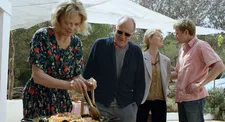 |
| Martha, Bruno, Elfriede and Jo: "One of the big moments for me is at the end when Bruno Ganz takes her hand to thank her for the paella." |
AKT: Bruno Ganz plays a man named Bruno, Marthe Keller gets the name Martha.
BS: The thing is, when we started working on the screenplay, we started calling the characters with the ideal actors we had in our minds.
AKT: Bruno Ganz didn't mind?
BS: Well, that's the first question I asked him. "I'm so sorry to ask you to read something where the character is called Bruno, and of course, since you played Hitler, it's very embarrassing. Please tell me!" He said: "No, no, no, it's okay with me."
AKT: Martha rocks the boat literally and symbolically for everybody else.
BS: Right. That's an announcement that she can be trouble and she is the type of character that is not afraid of doing crazy things. That's why I had lots of trouble with that scene because I didn't want it to be like a sadistic scene. I wanted her to make things funny.
AKT: Well, it's a little sadistic, isn't it?
BS: It is, it is. We went and re-looped the scene and put a lot of concern in her voice when she said "Are you okay?" Not to be flippant, or not caring.
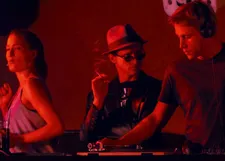 |
| Clarissa (Marie Leuenberger) and Rudolfo (Joel Basman) with Jo at Amnesia |
AKT: It's nice that we get a bit of the baby sound at the start. That's beautiful editing. We don't know who is shouting. A child from the past? You, the child, are shouting from somewhere, perhaps? I thought that was very nice. Clarissa [Marie Leuenberger], "our muse", doesn't get much to say?
BS: She is not really part of the story, you know. The story is really about him [Jo] and Martha.
AKT: I am, of course, familiar with the work of Marthe Keller and Bruno Ganz and I have also seen Max Riemelt on the screen. I was not familiar with Corinna Kirchhoff, who plays Jo's mother. She is very good.
BS: She's fantastic. Oh, she's an incredible actress.
AKT: Does she come from theatre?
BS: Yes, she won best actress of the year many times. She's a top theatre actress. You know, the wonderful thing about casting today, at least in Germany, is when you call the agents, you could have access to their video demos. And in the demo it's the actor himself who chooses the scenes that he likes. So you see if he is intelligent, if he is talented. And her tape was riveting!
One scene after the other was totally different characters, totally different scenes. I mean, I thought I was watching a female Marlon Brando or something. It was very hard for her to come because she had engagements in theatres. But I thought she was an essential character.
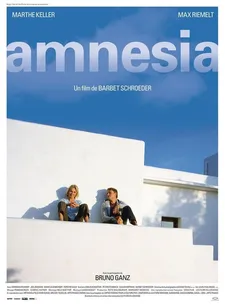 |
| Amnesia poster |
AKT: The dialogue she has with Martha about selfishness! And then Martha says: "I know I'm your bad conscience, but that's not my problem." There's no winner in this battle.
BS: Yes, exactly. That was very important to introduce that ambiguity. This movie is really the equivalent of chamber music. Very interior, very discreet, things are half-said or even unsaid. One of the big moments for me is at the end when Bruno Ganz takes her hand to thank her for the paella and she doesn't know if she is going to take his hand and then she touches it. For me this is a super moving moment.
There's another moment between Martha and Jo when he touches her on her back for one second. For me it's like, the indians have arrived. Maybe for some spectators it's nothing but for me it is huge because they are not supposed to touch each other.
AKT: "We've already been what we could be for each other," is a sentence Martha says, a quote her friend Alex told her a long time ago.
BS: Because there was the same difference in age between Alex and her then. They could go no more because they have been an incredible amount of things for each other. It cannot go on forever, that's the idea.
AKT: But then it does in your film, no?I thought it was a very ambivalent line.
BS: But they are not in the same relationship. They do not wait to meet each other and have butterflies in their stomach. It's more peaceful.
Coming up - Barbet Schroeder on his famous grandfather Hans Prinzhorn, Walter Benjamin and Raoul Hausmann, the fascinating water system of Ibiza architecture, employing a frame in Amnesia going ten years back to 1990, after the fall of the Berlin Wall, More and the music of Pink Floyd.
Amnesia opens in the US on July 21.





















